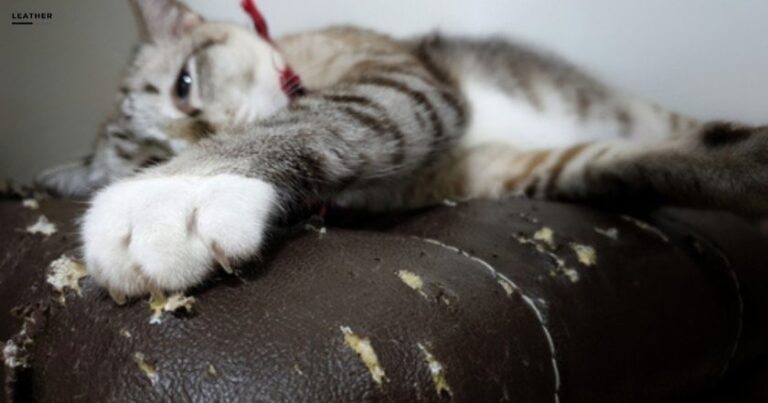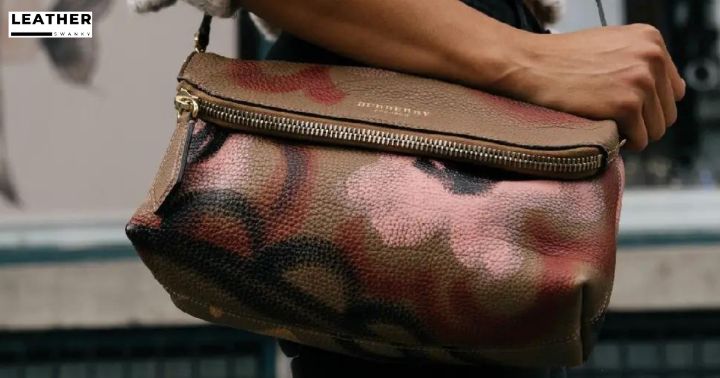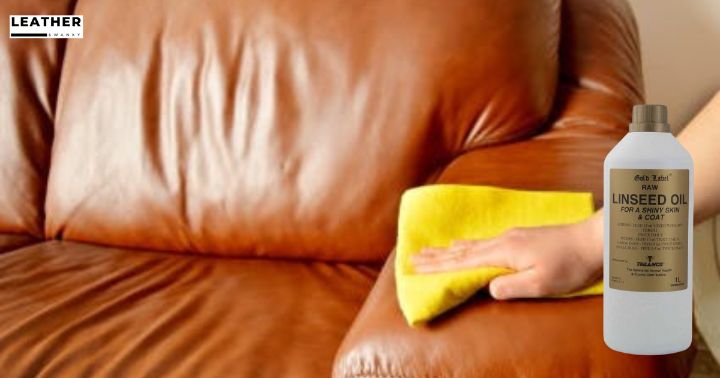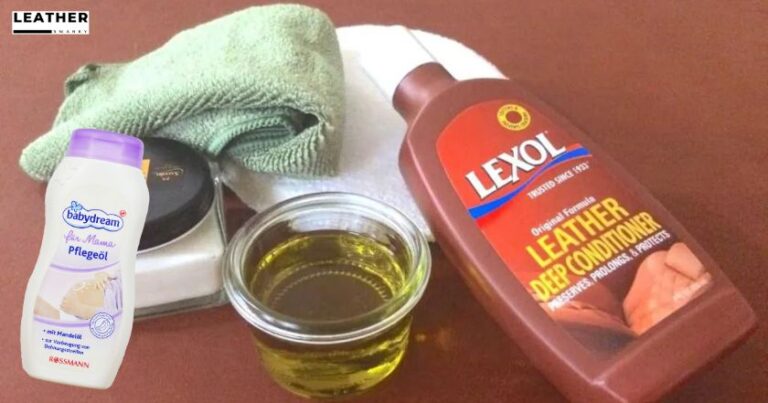Can You Use Mineral Oil On Leather? The Ultimate Guide
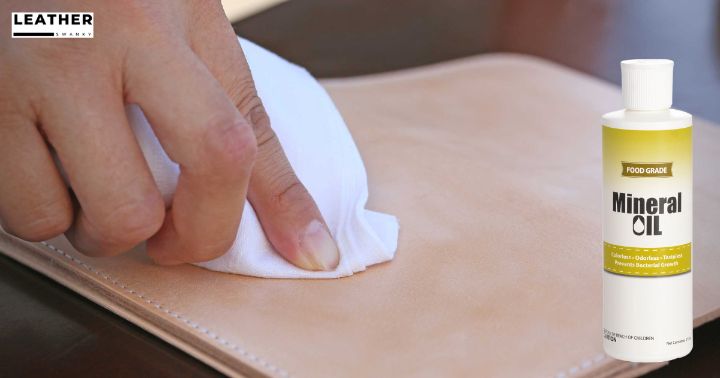
Leather is a luxurious material used to make clothing, accessories, furniture, and other items. In order to keep your leather looking its best for years to come, you need to take care of it.
One of the ways you can do this is by using mineral oil on the leather. But can mineral oil be safely used on leather? Read on to find out if it’s a good idea and how you should use it correctly.
Jump to a Specific Section
- 1 Key Takeaways
- 2 The Importance of Leather Care
- 3 What is Mineral Oil?
- 4 Is Mineral Oil Good for Leather?
- 5 How to Apply Mineral Oil?
- 6 When Should You Use Mineral Oil on Leather?
- 7 When Shouldn’t You Use Mineral Oil on Leather?
- 8 Coconut Oil vs. Mineral Oil vs. Mink Oil vs. Baby Oil
- 9 Comparison of Using Different Oils on Leather
- 10 Alternatives to Mineral Oil for Leather Care
- 11 Pros and Cons of Using Mineral Oil on Leather
- 12 Additional Tips and Suggestions
- 13 Conclusion
- 14 Frequently Asked Questions
- 14.1 Can you use mineral oil on suede leather?
- 14.2 What is the best way to remove mineral oil from leather?
- 14.3 Is mineral oil safe for use on leather furniture?
- 14.4 Does mineral oil damage leather over time?
- 14.5 Does mineral oil repel water from leather?
- 14.6 Can you use mineral oil on leather?
- 14.7 What kind of oil should I use on leather?
- 14.8 Can I use olive oil on the leather?
- 14.9 Can I use mineral oil on leather boots?
- 14.10 How do I condition leather?
- 14.11 Can I use coconut oil on leather?
- 14.12 What is the best oil for leather?
- 14.13 How do I maintain leather products?
- 14.14 Can I use mink oil on the leather?
- 14.15 How can I soften and waterproof leather?
- 15 Ressources Used for Research
Key Takeaways
- Leather needs regular conditioning with oils and conditioners.
- Mineral oil is suitable for conditioning and restoring dry or cracked leather.
- Avoid using mineral oil on leather in good condition.
- Use specialized oils like mink or baby oil designed for leather.
The Importance of Leather Care
Taking care of your leather is important, so make sure you give it the attention it deserves. Leather needs to be conditioned regularly with specific oils and conditioners in order to keep its strength, suppleness, and shine. Neatsfoot oil, mink oil, coconut oil, and mineral oil are all popular options for conditioning leather.
For a more thorough treatment, use products that combine natural oils with waxes or other conditioners. A combination of natural oils such as neatsfoot oil and mink oil along with a leather conditioner can offer superior protection against fading, drying out, cracking, or peeling.
Coconut oil has also been used as an effective natural moisturizer for leather. Mineral oil is another option that can provide protection from dirt, dust, and moisture while preventing cracking or fading over time. With a little bit of time and effort your leather will look great for years to come.
To ensure the best results when caring for your leather goods be sure to use only quality products designed specifically for this purpose. With proper care and maintenance, your leather items should last you many years.
What is Mineral Oil?
Minerals oil is a petroleum-derived liquid, made up of hydrocarbons with long molecular chains. It’s used in many industries, from automotive to pharmaceutical. But when it comes to leather care, should you use mineral oil? Here are 3 ways mineral oil affects leather:
- Use Mineral Oil: Mineral oil helps keep leather soft and supple by providing a protective barrier against dirt and dust.
- Oil for Leather: Applying small amounts of mineral oil can help condition the leather, making it more resistant to cracking and staining.
- Clean Leather: Mineral oil can be used as a cleaning agent to remove dirt and grime from the surface of your leather goods, without damaging them in the process.
With its ability to clean and condition your leather items, mineral oil may just be one of the best oils for taking care of your prized possessions – but should you use it on all types of leather? That’s what we’ll explore next!
Is Mineral Oil Good for Leather?
You may have heard of mineral oil being used as an ingredient in leather oils, but you may be wondering why it would be used in the first place. Mineral oil is a natural byproduct of petroleum and can act as an emollient on leather surfaces which helps to soften and lubricate the material.
In addition, due to its low cost, mineral oil makes for a great choice when looking for an affordable way to protect leather items.
Why is a Mineral Oil Used as an Ingredient in Leather Oils?
Using mineral oil in leather oils serves to lubricate the fibers of the material, helping to protect it from wear and tear. It also provides a barrier between the leather and any moisture or dirt that could cause damage. Here are some benefits of using mineral oil on leather:
- It helps preserve the natural color of the leather for longer periods of time
- It helps keep leather soft and supple by allowing oils to penetrate deep into its fibers
- Leather care is improved through regular conditioning with mineral oil products. Mineral oil can be used on any type of leather, including boots, furniture, bags, clothing, and more.
When applied regularly, it can help maintain a good condition for longer periods of time while providing protection against dirt and water damage. With proper use and maintenance, you can expect your items made of leather to last longer.
How to Apply Mineral Oil?
Applying mineral oil to leather has its risks, so it’s important to understand these before you begin. If done incorrectly, mineral oil can compromise the leather’s appearance and texture.
Before deciding to use mineral oil on a piece of leather, it’s crucial to consider the potential risks that come with it.
What are the Risks of Using Mineral Oil on Leather?
It’s important to understand the risks associated with using mineral oil on leather. Here are some key points to consider before you apply any oil:
- Leather Oil and Conditioner: Mineral oil should not be used as a conditioner or moisturizer. It can cause the fibers of the leather to break down, leading to cracking and splitting.
- Mineral Oil on Your Leather: Mineral oil will also darken your leather, so it is best used on items that won’t be exposed to much light.
- Mineral Oil May: In addition, mineral oil may clog the pores in the leather, which can lead to bacteria growth and odors.
Allow the Oil time to soak into the leather before wiping off any excess; otherwise, it may leave a sticky residue that attracts dirt and dust. To maintain the leather’s natural beauty, use only products specifically designed for leather care instead of mineral oil.
When Should You Use Mineral Oil on Leather?
When deciding whether to use mineral oil on leather, it’s important to consider the type of leather and its intended purpose. Mineral oil is a popular choice for conditioning leather because it preserves and softens the leather without damaging or darkening it.
It can also be used to restore neglected items back to their original condition. If your leather is particularly dry or cracked, mineral oil can help restore some of its original suppleness and texture. However, if your leather item is in good condition already, you should avoid using mineral oil as it may cause discoloration or other damage.
When using mineral oil on leather, it’s important to spot-test an inconspicuous area first before applying the product liberally over the entire surface. Additionally, never apply too much mineral oil as this can saturate the material and result in further damage.
Ultimately, when used responsibly, mineral oil can help keep your favorite leather items looking their best with minimal effort required. With that said, there are still times when you shouldn’t use mineral oil on your leather goods which will be discussed next.
When Shouldn’t You Use Mineral Oil on Leather?
You should never use mineral oil on leather if you want to avoid damaging it. Mineral oil is not meant for use with leather, even though it can help condition and protect the surface of the leather.
Applying mineral oil to leather may result in discoloration and deterioration over time. The best way to take care of your leather items is to use a product specifically meant for them, such as a mink or baby oil that contains no mineral oils.
These specialized oils are designed for use with leather and can provide more protection than mineral oil ever could. In some cases, coconut oil can also be used on leather items, but only when used sparingly and with caution as too much coconut oil will cause the item to dry out prematurely.
Remember: using the right product for your type of leather is key. As such, before applying any kind of oil onto your prized possession, make sure you know what’s best suited for it – otherwise you may end up doing more harm than good.
With this knowledge in mind, let’s move on to discussing the differences between coconut, mineral, and mink oils versus baby oil when applied to certain types of leather.
Coconut Oil vs. Mineral Oil vs. Mink Oil vs. Baby Oil
You may be wondering which oil is best for treating leather – coconut oil, mineral oil, mink oil, or baby oil. All of these oils can be used to treat and preserve leather products, but each has its own unique properties and qualities.
Coconut oil is a natural moisturizer that helps prevent cracking and stiffness; mineral oil works by forming an invisible barrier against water-based liquids as well as dirt; mink oil penetrates deep into the hide’s pores to soften the material; finally, baby oil adds shine while also protecting against dirt and stains.
Coconut Oil
Coconut oil is not recommended for use on leather, as it can cause discoloration. Though many people believe that it’s a viable option for conditioning leather products, there are far better options available. Here’s why you should avoid using coconut oil on leather:
- Coconut oil doesn’t absorb the material as well as other kinds of oil.
- It leaves an oily residue that can attract dirt and dust particles to the surface of the leather product over time.
- The natural oils in coconut oil have a tendency to darken lighter-colored leathers, so they may become discolored when exposed to repeated applications of coconut oil over time.
Using coconut oil on leather isn’t ideal, and opting for safer alternatives like mineral or mink oils are the much better choice for keeping your product looking its best without risking damage from discoloration or residual buildup.
Plus, these kinds of oils provide more nourishment than coconut oil does due to their higher viscosity levels and longer-lasting effects on the material itself.
Mineral Oil
Now that you know about the benefits of coconut oil on leather, let’s look at mineral oil. Mineral oil is an effective option for conditioning and protecting leather boots. Here are some of the pros and cons:
| Pros | Cons |
|---|---|
| Moisturizes leather boots | Not as natural as other oils |
| Protects from dirt buildup | Potential for discoloration |
| Forms a protective barrier | Can darken light-colored leather |
| Helps restore original sheen to leather boot | May cause staining when used on certain materials |
Oil is a natural way to care for your leather; however, it’s important to remember that mineral oil may not be suitable for all types of leather. To get the most out of your mink oil treatment, test it first on a hidden area before applying it directly to your entire boot.
Mink Oil
Mink oil is another popular choice for conditioning and protecting leather boots. It’s a type of oil that comes from the coat of mink, a weasel-like animal farmed specifically for its fur. This oil has been used in many leather care products due to its unique characteristics and properties:
- Mink oil is a thick, greasy substance able to penetrate deep into the pores of the leather material.
- The natural lubricants found within it help keep the leather soft and supple by preventing moisture loss over time.
- This oil also helps create an extra layer of protection against water damage, staining, and scratches on the surface.
Mink oil can be safely used on most types of finished or unfinished leather goods such as shoes, jackets, wallets, purses, and more. However, when using it always remember to test a small area first before applying it liberally across your entire item; this will help you determine how well your particular type of leather responds to mink oil treatment.
With its extraordinary qualities, mink oil is one excellent option if you’re looking for an effective yet gentle way to condition your leather items, making them last longer than ever before.
Baby Oil
Baby oil is a popular alternative to mink oil when it comes to conditioning leather items. It’s an effective way to maintain the look and feel of leather and can be used on all types of leather.
Baby oil is able to penetrate deeper into the leather fibers than mink oil, making it more effective in restoring suppleness and reducing cracking. Plus, it’s much cheaper than mink oil.
| Mink Oil | Baby Oil |
|---|---|
| Expensive | Cheap |
| Good for restoring suppleness | Great for restoring suppleness & reducing cracking |
| Not as deep-penetrating as baby oil | Deep-penetrating for better results |
When compared to mink oil, baby oil offers many advantages at a fraction of the cost. Its deep-penetrating properties help condition your leather so that it looks and feels its best.
With regular use, you can keep your favorite leather items looking new for years! Transitioning into the next section, let’s compare using different oils on the leather.
Comparison of Using Different Oils on Leather
You’ve heard about using mink oil or baby oil on leather, but how does mineral oil compare? When it comes to caring for leather, different oils can be used depending on the desired result. Leather oil is a popular choice because it helps waterproof and condition the material.
Olive oil is also widely recommended as a way to soften and nourish the pieces. Mineral oil can be used as well, but some people prefer alternatives that allow more breathability for their leather items.
When deciding which option to use for your leather goods, it’s important to make sure you’re using a clean product that won’t damage or discolor the material. Mineral oil may not provide the protection of other options like mink or baby oils, so it’s important to do research before choosing what type of product works best for your items.
Regardless of what you decide, always use a clean cloth when applying any type of oil to your leather goods, and be sure to test on an inconspicuous area first in case there are any adverse reactions.
Taking these extra steps will help ensure you get the best results from whatever type of oils you choose in order to protect and maintain your beloved leather possessions.
Alternatives to Mineral Oil for Leather Care
Leather care doesn’t have to be difficult! Instead of using mineral oil to condition and protect your leather goods, why not try some natural alternatives?
Beeswax and castor oil conditioner work wonders for preserving leather, while lemon essential oil can be used to clean it. With these simple but effective methods, you’ll keep your leather looking good as new for years.
Beeswax and Castor Oil Conditioner
To make a beeswax and castor oil conditioner for your leather, you’ll need to mix equal parts of the two oils. This homemade leather conditioning solution is an ideal way to use leather oil, as it imparts moisture and shine while protecting the material from dirt and dust. Here’s what you’ll need to do:
- Melt 1/2 cup of beeswax in a double boiler.
- Add 1/2 cup of castor oil and stir until fully blended.
- Allow mixture to cool slightly before applying it with a soft cloth onto clean, dry leather.
This combination of care products will help treat leather without being too harsh on the material; plus, it can be used regularly to clean and condition leather over time.
Use this natural method as an alternative to commercial leather conditioners for superior results that won’t harm the environment or your wallet.
Lemon Essential Oil
Lemon essential oil is a great addition to homemade leather care products, as it helps add shine and protection while naturally freshening the material. This oil may be used in a variety of ways when caring for your leather item, such as added to a conditioner or directly applied to the leather itself.
The oil is known for containing antiseptic properties which help protect the leather from bacteria and mold that can cause damage. When applying the oil to your leather, make sure you use it just enough so that it doesn’t get too greasy.
By adding some lemon essential oil to your cleaning routine, you will ensure maximum protection and shine with each use. Transitioning nicely into the next topic of discussion: examining the pros and cons of using mineral oil on leather.
Pros and Cons of Using Mineral Oil on Leather
You may be considering using mineral oil on your leather, but it’s important to weigh the pros and cons before you do. On one hand, mineral oil is inexpensive and easy to find; however, it can dry out the leather and cause cracks over time. You’ll need to decide if the benefits of mineral oil outweigh these potential drawbacks.
Pros
Using mineral oil on leather has its advantages, like keeping the material from drying out or cracking. Leather cleaner is a safe and effective way to use mineral oil on your leather items.
This helps soften and waterproof the leather, while also nourishing it to keep it looking its best. You may also find that olive oil can be used as well, although it doesn’t penetrate the surface of the leather as deeply as mineral oil does.
Mineral oil is an affordable option for those who want to make sure their leather pieces stay in good condition for many years. The application process is easy and can help prolong the life of any item made with this material.
Cons
However, there are also some drawbacks to using mineral oil on leather. The oil can make the leather very soft and supple, but it can also cause it to wear out faster. Additionally, if too much is used or if the oil is not reapplied regularly, the leather can become overly saturated with oil and dry out more quickly.
It’s important to maintain your leather properly by cleaning it and applying a proper amount of oil in order to keep it looking its best. Applying mineral oil will help soften the leather, but you must be careful not to overdo it in order to prevent any damage from occurring.
By taking care of your leather items with proper cleaning and conditioning techniques, you can ensure that your items remain beautiful for years to come. With these considerations in mind, let’s look at some additional tips and suggestions for caring for your leather goods.
Additional Tips and Suggestions
If applied correctly, mineral oil can be a great way to condition leather. It’s important to understand that mineral oil is not designed to be a cleaning agent; it is meant for conditioning and softening the leather.
You should only use it after you have cleaned the leather with a suitable cleaner. Mineral oil helps protect the leather from damage over time while allowing it to remain supple and flexible.
To apply mineral oil, first, clean your leather item using a small amount of soap and warm water; then completely dry the item before applying the mineral oil. Use a small cloth or cotton swab to rub in just enough mineral oil to soften and protect the leather without leaving any excess behind.
Allow your leather item to sit for 24 hours after applying so that the oil can fully absorb into the material, then wipe off any remaining residue with a clean cloth or cotton swab. Following these steps will help keep your leather looking its best while protecting it from unnecessary wear and tear.
Conclusion
You now have a better understanding of what mineral oil is, and whether or not it’s suitable for use on leather. You know the steps to take when applying it, as well as when it should be used.
You’ve also seen some alternatives you can try if you decide against using mineral oil. Ultimately, there are pros and cons to using this particular oil, so choose wisely and keep your leather in top condition.
Frequently Asked Questions
Can you use mineral oil on suede leather?
No, you should not use mineral oil on suede leather as it can weaken the fibers and cause discoloration. It’s best to use a cleaner specifically designed for suede instead.
What is the best way to remove mineral oil from leather?
The best way to remove mineral oil from leather is to first dab the affected area with a clean cloth. Use a mild detergent and lukewarm water to create a solution, then apply it to the spot with a soft cloth. Gently scrub the area in circles until the oil has been removed. Dry off the leather and condition it afterward.
Is mineral oil safe for use on leather furniture?
Using mineral oil on leather furniture can cause discoloration and damage over time. We recommend conditioning the leather with a product specifically designed for that purpose instead.
Does mineral oil damage leather over time?
It is possible that mineral oil may cause damage to leather over time. The oil can penetrate the leather and cause it to become stiff and brittle, leading to cracking and fading of the material. It is best to use a specific leather cleaner or conditioner for best results.
Does mineral oil repel water from leather?
Yes, mineral oil can repel water from the leather. It forms a barrier that helps protect the material and stops it from absorbing moisture. However, be sure to use only a small amount or it could damage the leather over time.
Can you use mineral oil on leather?
No, it is not recommended to use mineral oil on leather. Mineral oil does not provide any conditioning benefits to leather and can actually cause damage in the long run. It may darken the leather and leave an oily residue. It is best to use specific oils that are designed for leather care.
What kind of oil should I use on leather?
The best oil to use on leather depends on your specific needs and the type of leather you are treating. Some popular options include neatsfoot oil, mink oil, and coconut oil.
These oils help soften and condition the leather while preserving its natural beauty. Always test the oil on a small, inconspicuous area of the leather before applying it to the entire surface.
Can I use olive oil on the leather?
While olive oil is a natural oil, it is not recommended for use on leather. Olive oil can darken the leather and leave a greasy residue. It is better to use oils specifically formulated for leather care.
Can I use mineral oil on leather boots?
It is not recommended to use mineral oil on leather boots. Mineral oil does not offer any benefits to the leather and can potentially cause damage. Instead, opt for oils that are designed for leather care, such as neatsfoot oil or mink oil.
How do I condition leather?
To condition leather, you can use a leather oil or conditioner. Apply a small amount of the oil or conditioner onto a clean, soft cloth and rub it onto the leather in a circular motion. Make sure to cover the entire surface evenly.
Allow the oil or conditioner to absorb into the leather for a few hours or overnight, then wipe off any excess with a clean cloth.
Can I use coconut oil on leather?
Yes, you can use coconut oil on leather. Coconut oil is a natural oil that helps soften and condition leather. Apply a small amount onto a clean, soft cloth and rub it onto the leather in a circular motion. Make sure to cover the entire surface evenly.
Allow the coconut oil to absorb into the leather for a few hours or overnight, then wipe off any excess with a clean cloth.
What is the best oil for leather?
The best oil for leather depends on the type of leather you are treating and your specific needs. Some popular options include neatsfoot oil, mink oil, and coconut oil.
These oils help soften and condition the leather while preserving its natural beauty. It is always recommended to test the oil on a small, inconspicuous area of the leather before applying it to the entire surface.
How do I maintain leather products?
To maintain leather products, it is important to regularly clean and condition them. Use a mild leather cleaner to remove any dirt or stains, and then apply a leather conditioner to keep the leather soft and prevent it from drying out.
Avoid exposing the leather to excessive heat or direct sunlight, as this can cause the leather to fade or crack. Additionally, store leather products in a cool, dry place when not in use.
Can I use mink oil on the leather?
Yes, mink oil can be used on leather. Mink oil is a popular choice for conditioning and protecting leather. It helps soften the leather and repels water, making it a great option for leather boots, jackets, or other leather products that are exposed to the elements.
Apply a small amount of mink oil onto a clean, soft cloth and rub it onto the leather in a circular motion. Allow it to absorb into the leather, then wipe off any excess with a clean cloth.
How can I soften and waterproof leather?
To soften and waterproof leather, you can use specific leather oils or conditioners. These products help soften the leather fibers and create a protective barrier against moisture.
Apply a small amount of the oil or conditioner onto a clean, soft cloth and rub it onto the leather in a circular motion. Make sure to cover the entire surface evenly. Allow the product to absorb into the leather, then wipe off any excess with a clean cloth.

